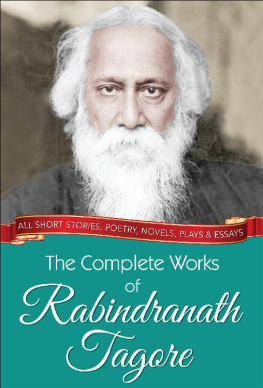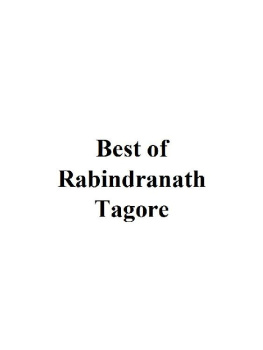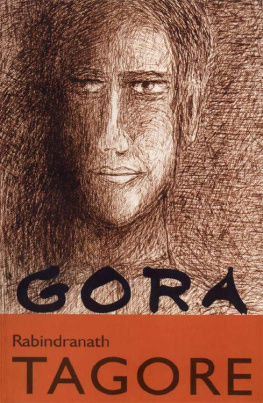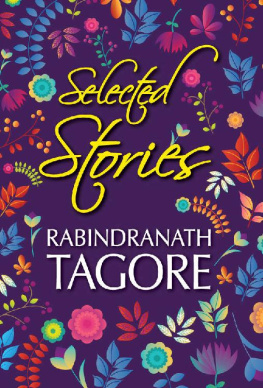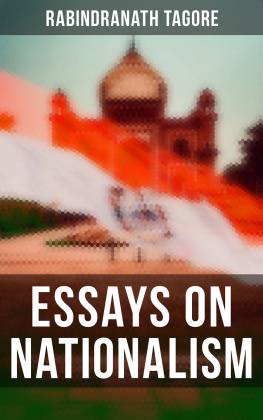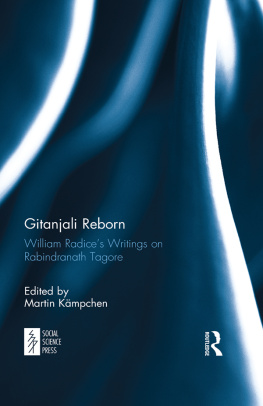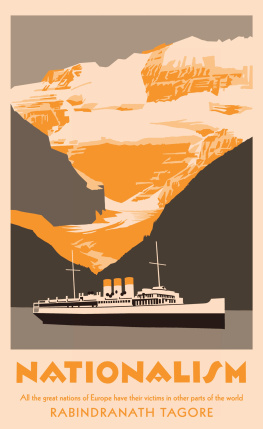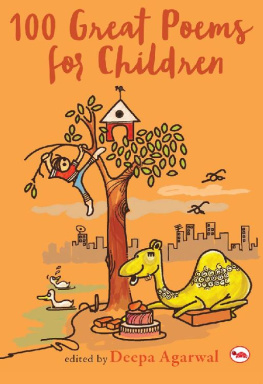
RABINDRANATH TAGORE: SELECTED POEMS
RABINDRANATH TAGORE was born in 1861, into one of the foremost families of Bengal. He was the fourteenth child of Debendranath Tagore, who headed the Brahmo Samaj (a Hindu reform movement). The family house at Jorasanko in Calcutta was a hive of cultural and intellectual activity. Tagore was educated by private tutors, and first visited Europe in 1878. He started writing at an early age, and his talent was recognized by Bankimchandra Chatterjee, the leading writer of the day. In the 1890s Tagore lived mainly in rural East Bengal, managing family estates. In the early 1900s he was involved in the svade campaign against the British, but withdrew when the movement turned violent. In 1912 he came to England with Gitanjali, an English translation of some of his religious lyrics. It was acclaimed by W. B. Yeats and later published by Macmillan, leading directly to his winning the Nobel Prize for Literature in 1913. In the 1920s and 1930s he made extensive lecture tours of America, Europe and the Far East. Proceeds from these tours, and from his Western publications, went to Visva-Bharati, the school and international university he created at Santiniketan, a hundred miles north-west of Calcutta.
Tagore was a controversial figure at home and abroad: at home because of his ceaseless innovations in poetry, prose, drama and music; abroad because of the stand he took against militarism and nationalism. In 1919 he protested against the Amritsar Massacre by returning the knighthood that the British had given him in 1915. He was close to Mahatma Gandhi, who called him the Great Sentinel of modern India; but he generally held himself aloof from politics. His own translations (Collected Poems and Plays of Rabindranath Tagore, 1936) have not proved sufficient to sustain the worldwide reputation he enjoyed in his lifetime; but as a Bengali writer his eminence is unchallenged. His works run to thirty-two large volumes. They contain some sixty collections of verse; novels such as Gora and The Home and the World; experimental plays such as The Post Office and Red Oleanders; and essays on a host of religious, social and literary topics. He also wrote over 2,000 songs, which have become the national music of Bengal, and include the national anthems of both India and Bangladesh. Late in life he took up painting, exhibiting in Moscow, Berlin, Paris, London and New York. He died in 1941.
WILLIAM RADICE was born in 1951 in London. He has pursued a double career as a poet and as a scholar and translator of Bengali, and has written or edited nearly thirty books. In addition to his translations of Tagore for Penguin, his publications include eight books of his own poems, Teach Yourself Bengali (1994), Myths and Legends of India (2001) and A Hundred Letters from England (2003). He has also translated from German (Martin Kmpchens The Honey-Seller and Other Stories, 1995, and Sigfrid Gauchs autobiographical novel Traces of My Father, 2002) and Italian (Puccinis Turandot for English National Opera). He wrote the libretto for Param Virs Tagore-based chamber opera Snatched by the Gods (1992). He has contributed regularly to BBC radio, has lectured widely in South Asia, North America and Europe, and has been given literary prizes in India and Bangladesh.
William Radice is Senior Lecturer in Bengali at SOAS, University of London, and from 1999 to 2002 was Head of the Departments of South and South East Asia. He lives in London and Northumberland.
RABINDRANATH TAGORE
Selected Poems
Translated by WILLIAM RADICE
PENGUIN BOOKS
Dedicated to the Peace Movement and to E. P. Thompson (19241993)
PENGUIN BOOKS
Published by the Penguin Group
Penguin Books Ltd, 80 Strand, London WC2R 0RL, England
Penguin Group (USA) Inc., 375 Hudson Street, New York, New York 10014, USA
Penguin Books Australia Ltd, 250 Camberwell Road, Camberwell, Victoria 3124, Australia
Penguin Books Canada Ltd, 10 Alcorn Avenue, Toronto, Ontario, Canada M4V 3B2
Penguin Books India (P) Ltd, 11 Community Centre, Panchsheel Park, New Delhi 110 017, India
Penguin Group (NZ), cnr Airborne and Rosedale Roads, Albany, Auckland 1310, New Zealand
Penguin Books (South Africa) (Pty) Ltd, 24 Sturdee Avenue, Rosebank 2196, South Africa
Penguin Books Ltd, Registered Offices: 80 Strand, London WC2R 0RL, England
www.penguin.com
First published in Penguin Books 1985
Reprinted with revisions 1987
Reprinted with revisions 1993
Reprinted with a new Preface and an additional Appendix 1994
Reprinted with a new Preface, Further Reading and corrections in Penguin Classics 2005
Translation, Introduction, Notes, Glossary and Further Reading
copyright William Radice, 1985, 1987, 1993, 1994, 2005
All rights reserved
Except in the United States of America, this book is sold subject to the condition that it shall not, by way of trade or otherwise, be lent, re-sold, hired out, or otherwise circulated without the publishers prior consent in any form of binding or cover other than that in which it is published and without a similar condition including this condition being imposed on the subsequent purchaser
ISBN: 9781101491362
Contents
Preface to the 2005 Edition
This book is now celebrating its twentieth anniversary, and I present it this time without any apologia. In the first edition of 1985 I was nervously presenting my work for the first time, aware of those before me who had fallen short, and wondering if my own attempts to present and translate Rabindranath Tagore would be any more successful. On the whole, the response across the world proved positive not least among Tagores ever-watchful compatriots. In the Preface to the 1994 edition, however, I felt obliged to take account of E. P. Thompsons charge that I had unfairly dismissed the work of his father, Edward Thompson. I tried to put matters straight not only in the Preface but in an additional appendix which can now, I think, along with the 1994 Preface itself, be safely removed.
The 1994 Preface was also an opportunity to mention the expansion of interest in Tagore that had developed since my book was published: the new translations that had appeared not only in English but in other European languages, and musical adaptations such as Param Virs chamber opera, Snatched by the Gods. The expansion has gone on, but this time it is best conveyed by the list of Further Reading. In 1985 it would have been hard to compile such a list without including many older books and translations that even then were no longer in print. But now a list much longer than the one I have supplied could be made up of books currently available. In India, especially, numerous books have appeared, uninhibited by any copyright restrictions. (Copyright in India was extended by a special act of Parliament in 1991, fifty years after Tagores death, but the extension came to an end in 2001.)
One issue that I discussed in both the 1985 and 1994 Prefaces was whether it was right to go on using Tagore, an anglicized form of Thkur, or whether we should call the poet as Bengalis do Rabindranath. I decided to stick to Tagore, writing in 1985: I regret this, as Rabindranath is a much more beautiful and expressive name than Tagore (it means Lord of the Sun), and I respect other writers who have tried to adopt it. But Tagore is convenient.
Partly because Tagore is widely used in India outside Bengal, as well as all over the world (sometimes with the final e pronounced as a syllable), there seems little chance of its displacement. In fact, the existence of these two names is a useful shorthand for Tagores Indian and international career (as Tagore) and his specifically Bengali identity as Rabindranath. In lectures and essays I have often depicted the two names as overlapping circles. The two careers developed separately from each other in some ways, yet they also partook of each other. Rabindranath went on informing Tagore; yet the international fame and responsibilities that Rabindranath acquired after he won the Nobel Prize in 1913 also impinged on his Bengali identity.
Next page

